#j.c. trewin
Text
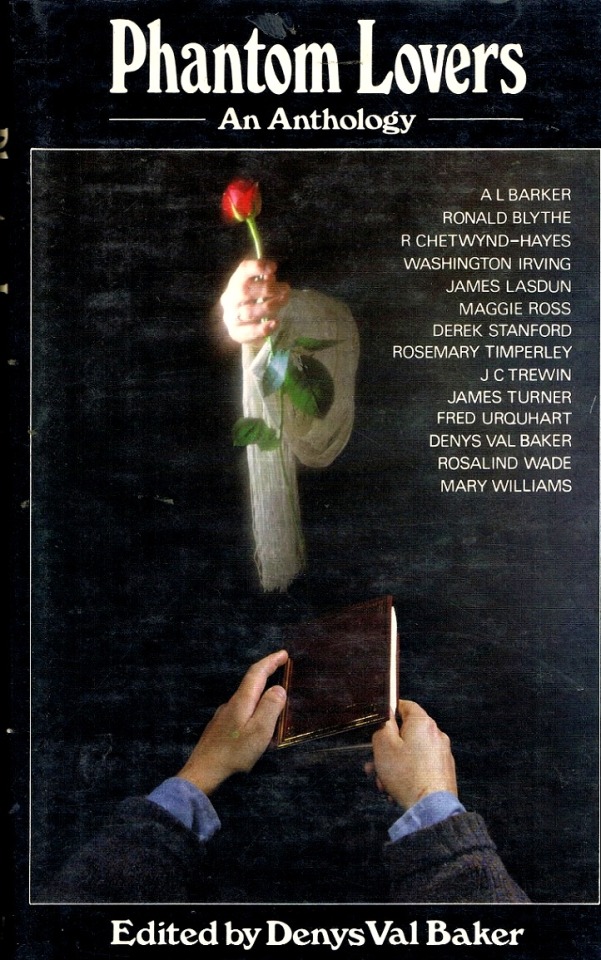
Denys Val Baker (editor) - Phantom Lovers - William Kimber - 1984
#witches#phantom lovers#occult#vintage#phantoms#lovers#william kimber#denys val baker#a.l. barker#ronald blythe#r. chetwynd-hayes#washington irving#james lasdun#maggie ross#derek stanford#rosemary timperley#j.c. trewin#james turner#fred urquhart#rosalind wade#mary williams#1984#anthology
29 notes
·
View notes
Text
Anastasia Nikolaevna and Mr. Gibbes
"Through the years he preserved from Tobolsk two cheap exercise books, each labelled ‘English’. ‘M. Romanof’ had written her name on one label. The other book belonged to 'A. Romanova (Shut Up!) Tobolsk 1917-1918.’ Grand Duchess Anastasia, more exuberantly talkative than her sisters, seized on one of Gibbes’s exasperated moments. When he told her to shut up, she asked him how to spell it and adopted it as her nickname."
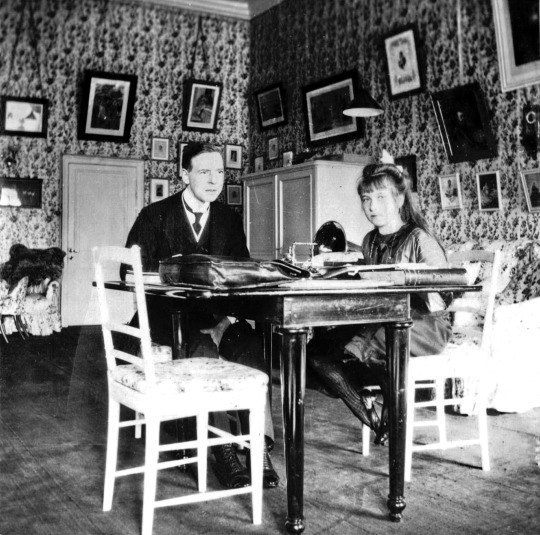
Sources: Tutor to the Tsarevich - J.C. Trewin, Sydney Gibbes
#anastasia nikolaevna#anastasia romanov#sources#sydney gibbes#sidney gibbes#tutors#tobolsk#1917#1918#my own
38 notes
·
View notes
Text
december-dragon replied to your post “Analysis: why Maria accepts Anna as Anastasia”
Is the script available as a book?
Yep! I got the Samuel French version of Anastasia - acting edition is © 1956 - from the local library, but the radio play follows much the same script. There’s also a previous one published in Plays of the Year Vol. 9 by J.C. Trewin in 1953, which is what I’ve been reading lately. Both are written by Marcelle Maurette and translated by Guy Bolton.
If you want either, drop me a line and I’ll hand out links; I don’t necessarily want a public link out since the radio play just got pulled from YT.
The 1956 film also keeps pretty close to the script in parts, but completely minimizes Serensky’s role and chooses to pair Anna with Bounine instead, which I’m not a huge fan of. It does revise a lot of Anna’s scenes with Maria in ways that are incredibly interesting, even if both versions are equally good.
#december-dragon#kat replies#december dragon#Anastasia play#this is an open invite to everyone btw#I will give these out because I want more people to read them
1 note
·
View note
Photo




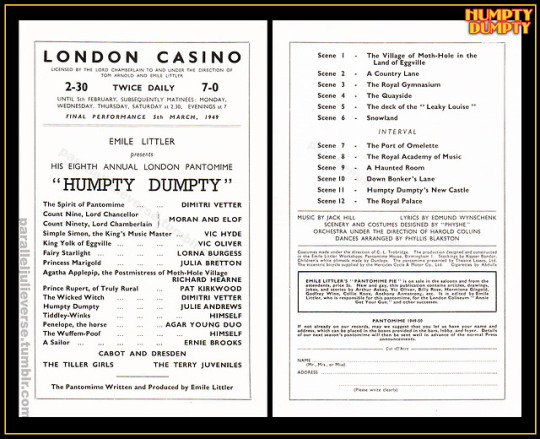

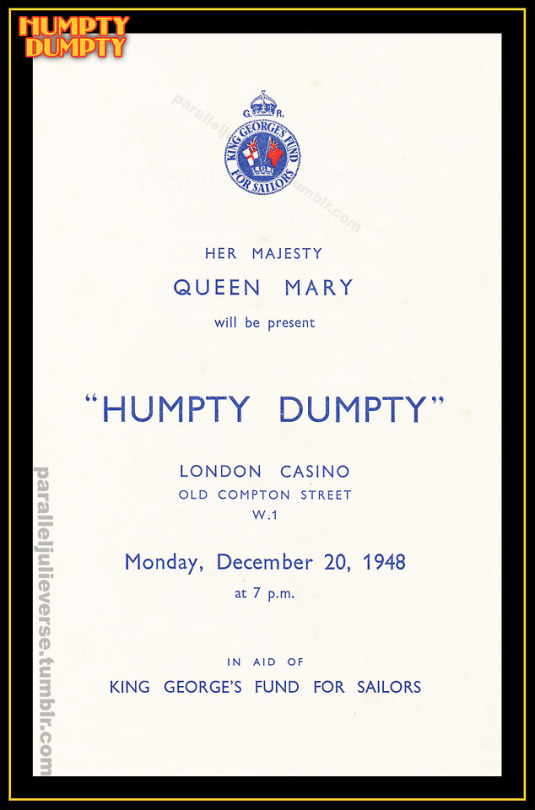


70th anniversary of Julie Andrews Christmas pantomime debut in Humpty Dumpty
London Casino, 119 performances
(21 December 1948 - 5 March 1949)
Seventy years ago this month, the young Julie Andrews realised another significant career milestone when she made her professional pantomime debut in Emile Littler’s all-star production of Humpty Dumpty. Blending music, dance and slapstick into a family variety entertainment, pantomimes, or ‘pantos’ as they are popularly known, are a longstanding British theatrical staple most popularly staged at Christmastime. And Emile Littler, part of a dynasty of theatrical impresarios that ruled the West End for decades across the mid-20th century, was the undisputed king of Christmas pantomime spectaculars (Hughes, 128).
Being cast in a Littler ‘panto’ was, thus, a major professional coup for the 13-year-old Julie Andrews who had not long come out of her acclaimed twelve-month stint in Starlight Roof. Cast alongside fellow Starlight Roof alumni, Vic Oliver and Pat Kirkwood, and other major UK stars of the era such as comedian Richard Hearne, Julie assumed the titular role of Humpty the Egg. As Julie recalls:
“My first entrance in the show was accompanied by great flashes of lightning and a blackout. The big, prop egg on the wall toppled backward and I, lying on my back in a second, cracked egg backstage, would be thrust upright and through a hidden door in the wall during the blackout to be revealed, sitting cross-legged and surprised, at the foot of it. I was dressed as a boy, with shorts, suspenders, and a jacket. I don’t remember much about my role, but at some point in the show I sang an obligatory song, “I Heard a Robin Singing,” which had nothing whatsoever to do with the story. Fortunately, once again, I received a lovely ovation from the audience on opening night, and the following morning the headlines of one review stated: ‘Young Julie Andrews as usual stole the show’ (Andrews, 95).
Indeed, Julie was singled out in nearly all the show’s notices, with reviewers praising not only her virtuoso singing but accomplished juvenile acting skills:
“Julie Andrews, the 13-year-old pocket-sized soprano, made her pantomime debut..and, once again stopped the show with her grown-up trills. The title role gives her more to say but less to sing than before, but in song and speech alike she is sweetly, unprecociously self-assured” (Wilson, 3).
“The…outstanding success of the show is Julie Andrews, who not only uses that remarkable voice of hers to full advantage…but acts in a convincing manner. She has plenty to do and does it all well.” (“The Casino”, 2).
“The star of the show is little Julie Andrews as Humpty Dumpty. Her singing is in the top class and she is also a spirited actress” (”London Letter,” 2).
“Humpty Dumpty––as mischievous as is unorthodox––is little Julie Andrews, whose high trilling notes and superb self-confidence took the audience of ‘Starlight Roof’…by surprise and destined her for a Humpty Dumpty of no ordinary kind” (“Humpty Dumpty”, 2).
“Little Miss Andrews, as Humpty Dumpty himself, stopped the show, as the saying runs, with her singing” (”London Notes”, 2).
“A spectacular production…with the pure, unforced soprano of small Julie Andrews proving most effective” (”Panto is Hatched”, 3).
“There is Miss Julie Andrews, who is hardly old enough to be interested in anything but Pêche Melbas, and vocally is really rather a peach of a Melba herself” (”Pantomimes”, 2).
“And, finally, a plum indeed, little Miss Julie Andrews as Humpty treats us to singing incredibly mature for her age” (Keown, 24).
With rave reviews like that, it’s no surprise that Humpty Dumpty proved a huge success. Even before the show opened, 50,000 tickets had pre-sold across the projected two month run (”Variety Gossip”, 3). Demand was so great that Littler opted to extend the season an extra month till 5 March (”Chit Chat”, 6).
Humpty Dumpty even attracted the attention of some rather notable theatregoers. The show was selected for a special pre-opening Royal Performance on 20 December in aid of King George’s Fund for Sailors. Queen Mary was the official royal sponsor of the benefit and she brought along the Duchess of Kent and her two elder children, the Duke of Kent and Princess Alexandra, all of whom “laughed heartily at the antics” and joined the “tremendous applause” at the close (“Jennifer Writes”, 6). During the interval, Julie and several of the other principals were presented to the Queen (”Queen Mary”, 4). Word of the show must have spread back at the Palace because a few weeks later, Princesses Elizabeth and Margaret attended a performance, escorted by the Duke of Edinburgh (”Princesses”, 1).
Several press reports made special mention of the fact that Julie was unwell for the opening of Humpty Dumpty with what was described as “a cold” but that, in true trouper spirit, she went on and sang beautifully (Wilson, 2). She would, however, miss a performance on the night of December 28 requiring one of the juvenile dancers from the chorus, Shirley (Fuzzy) Alpress, to take over “at a moment’s notice” (”Understudy”, 5). Years later, in her autobiography Julie recalls that she actually had the mumps during the run but was sworn to secrecy by her mother, which can’t have been easy for her, physically or emotionally (Andrews, 96).
With Humpty Dumpty, Julie Andrews proved herself a rounded theatrical performer and not just a one-trick novelty act suggested by her “prima donna in pigtails” turn in Starlight Roof. Co-star Pat Kirkwood later reflected:
“However nervous Julie may have been in Humpty Dumpty, she seemed to have a certain inner strength in that she always knew what she wanted to do and did it. I don’t think she had ever acted before in her life, but she played this part so beautifully, with a kind of simplicity and innocence which she still brings across today” (Cottrell, 51).
Julie’s breakout success in Humpty Dumpty would help secure parts in subsequent Christmas pantos, pretty much every year thereafter, culminating in the lead role of Cinderella at the Palladium in 1953/54 where she came to the attention of visiting US producers looking for a new star to lead the Broadway production of The Boy Friend. And, well, the rest as they say…
Sources:
“And Now the Pantos.” Daily Mirror. 24 December 1948: 3
Andrews, Julie. Home: A Memoir of My Early Years. New York: Hyperion, 2008.
“The Casino: ‘Humpty Dumpty’.” The Stage. 31 December 1948: 2.
“Chit Chat.” The Stage. 28 October 1948: 6.
Cottrell, John. Julie Andrews: The Story of a Star. London: Arthur Barker, 1968.
Hughes, Maureen. A History of Pantomime. London: Sword and Pen, 2013.
“’Humpty Dumpty’ Review.” The Times. 22 December 1948: 2.
“Jennifer Writes Her Social Journal.” The Tatler and Bystander. 5 January 1949: 6.
Keown, Eric. “At the Play.” Punch. 5 January 1949: 20.
Kirkwood, Pat. The Time of My Life. London: Robert Hale, 1999.
“London Letter.” Western Morning News. 23 December 1948: 2.
“London Notes.” Yorkshire Post and Leeds Mercury. 22 December 1948: 2.
“The Panto is Hatched.” Daily Herald. 22 December 1948: 2.
“Pantomimes.” The Sunday Times. 2 January 1949: 2.
“Princesses at Panto.” The Birmingham Gazette. 4 January 1949: 1.
“Queen Mary at Preview of Pantomime.” The Guardian. 21 December 1948: 4.
“A Royal Visit to ‘Humpty Dumpty’.” The Sphere. 1 January 1949: 24.
Trewin, J.C. “The World of the Theatre.” The Illustrated London News. 15 January 1949: 92.
“The Understudy (aged 13).” Daily Mirror. 29 December 1948: 5.
“Variety Gossip.” The Stage. 19 August 1948: 3.
Willis, Ted. “Practice for the Panto.” Daily Worker. 17 December 1948: 2.
Wilson, Cecil. “Julie Does It Again.” Daily Mail. 22 December 1948: 3.
© 2018, Brett Farmer. All Rights Reserved.
#julie andrews#humpty dumpty#pantomime#panto#christmas#west end#London theatre#emile littler#70th Anniversary
17 notes
·
View notes
Text
Ranting About Shakespeare, LOL
J.C. Trewin’s Pocket Companion to Shakespeare’s Plays is often considered the go-to guide for people wanting to understand Shakespeare.
And I get that people absolutely need something simple and straight-forward to understand his works, because, damn, they can be hard to understand. But his writing is so bland and uninteresting. There isn’t much substance there.
He’s also downright wrong about some things. I mean, he says that Lady Macbeth can be an “overestimated” role ... I’m sorry, but Lady Macbeth is one of the most iconic female villainess roles in literature! That is not an exaggeration. She isn’t the central character, but damn if she isn’t a major driving force in the first few acts of the play!
2 notes
·
View notes
Photo

J.C. Trewin remembered Ian as "one of the best actors in Britain" and lamented his absence from the stage. Ian had left theatre after playing his stunning Mercutio in Romeo and Juliet and Khlestakov in The Government Inspector at the Old Vic in 1979. He was back on stage only in 1995 for playing Harpagon in Moliere ´s The Miser. J.C. Trewin was the author of a stunning book “Five and Eighty Hamlets” included Ian’s very first Hamlet at the Birmingham Repertory Theatre when he was 24 years old.
#ian richardson#great british actors#shakespearian actors#shakespeare#the royal shakespeare company#the rsc#stratford on avon
9 notes
·
View notes
Text
English composition written by Anastasia Nikolaevna as homework for her tutor
This piece is often mislabelled as being a letter to a friend. In actuality, Sydney Gibbes asked Anastasia to write a composition describing the family's trip to Tobolsk, in order to practice her English writing skills. She chose to write it in the form of a letter. Here is the composition in full, with her original mistakes.
My dear Friend. I will describe to you who [how] we travelled. We started in the morning and when we got into the train I went to sleap, so did all of us. We were very tierd because we did not sleap [had not slept] the whole night. The first day was hot and very dusty. At the stations we had to shut our window curtanse that nobody should see us. Once in the evening I was loking out of the window we stoped near a little house, but there was no staition so we could look out. A little boy came to my window and asked: "Uncle, please give me, if you have got, a newspaper." I said: "I am not an uncle but an anty and have no newspaper." At the first moment I could not understand why did he call me "Uncle" but then I rememberd that my hear is cut and I and the soldiers (which where standing next to me) laught very much. On the way many funy things had hapend, and if I shall have time I shall write to you our travell father on. Good by. Dont forget me. Many kisses from us all to you my darling. Your A.
SOURCE: Tutor to the Tsarevich, J.C. Trewin, Sydney Gibbes
The writing again, with corrections, for those who need to translate it:
My dear Friend. I will describe to you who [how] we travelled. We started in the morning and when we got into the train I went to sleep, so did all of us. We were very tired because we did not sleep [had not slept] the whole night. The first day was hot and very dusty. At the stations we had to shut our window curtains that nobody should see us. Once in the evening I was looking out of the window we stopped near a little house, but there was no station so we could look out. A little boy came to my window and asked: "Uncle, please give me, if you have got, a newspaper." I said: "I am not an uncle but an aunty and have no newspaper." At the first moment I could not understand why did he call me "Uncle" but then I remembered that my hear is cut and I and the soldiers (which where standing next to me) laughed very much. On the way many funny things had happened, and if I shall have time I shall write to you our travel father on. Good bye. Don't forget me. Many kisses from us all to you my darling. Your A.
#anastasia nikolaevna#anastasia romanov#letters#writings#tutors#sources#sydney gibbes#sidney gibbes#1917#tobolsk
18 notes
·
View notes
Link
I’ve made a tonne of updates to my tiers recently!
For $1
Great Character Writing Series/Liveblogs
You can vote on a character for a Great Character Writing article, and vote and nominate a monthly liveblog. This could be a short series, a movie, or even a manga. I will write a Patron exclusive review/analysis for it once I'm finished. You also get to choose the next review I do for animated movies. And you get automatic access to my discord.
For $2
Writing Tips
On this tier, you'll gain access to writing tips and insights.
For $3
Shakespeare Overview and Performances Podcast
I go through Shakespeare's plays one-by-one with the help of J.C. Trewins' The Shakespeare Companion. I look at past performances and key ideas covered in the plays. I'll end each podcast by performing a part of the play! Still setting everything up for this one.
For $5
Short Story Legends
On this tier, I will write a 500-word story (original or fanfiction) or a history based article. Or, I could provide feedback on your 500-word story! I have worked professionally as an editor and ghostwriter. You can also nominate a topic for me to make a post on tumblr. You'll gain access to Patreon exclusive short stories.
Feedback is always welcome!
For $10
League of Awesome
For this tier, you can request a write a multi-part original story, or fanfiction. Or you can request a 1000+ word article on any topic. I can provide feedback on your own multi-chapter story. You'll gain access to excerpts from my major projects, character profiles, and world-building notes. You'll also be the first to gain access to prizes once I've reached my first goal. The choices available will be:
DVD's
A brand new full series Princess Tutu DVD set
Fruits Basket full series DVD set
Planetes full series DVD set
Read or Die DVD containing the first three episodes
Manga
Volume 1 of the Sailor Venus manga
Volume 1 of the Sailor Moon manga
Comics
Avatar: The Last Airbender The Lost Adventures
Gotham City Sirens: Union by Dini March
Wonder Woman: Eyes of the Gorgan by Greg Rucka
Wonder Woman: Land of the Dead by Greg Rucka
The Amazing Spider-Girl: Mind Games by Tom DeFalco and Ron Frenz
1 note
·
View note
Link
Okay, made much-needed updates to the description and tiers on my Patreon page!
----------------------------------------------------------------------------------------------------------
Welcome!
Hi, I'm Lauren, otherwise known as Elle on most social media I'm working on publishing a novel, but I also want to focus on other projects, so I can practice my craft and make a name for myself as a writer.
Content:
I write original stories of all kinds, but mostly those in the fantasy and sci-fi genres. They range from short stories to ongoing series. You'll also see fanfiction and on-going projects on Australian history. I've also started a series of articles on character analysis that include quotes, images and writing insights. You can also find monthly liveblog on various movies and series on my Tumblr.
What Do You Get?
You can get writing tips on things from character arcs to plotting. You can also access podcasts looking at the ins and outs of Shakespeare plays. We'll look at the themes, plot, and history of his plays in a way that makes the man's work a bit more understandable if you'restudying his plays, or just want to know more about them. And the podcasts will probably focus on other works of literature too in future. Suggestions are very welcome!
Projects and Resources:
I like to attend lots of creative writing workshops, conferences, and events that will help me improve my skills and help create new, (hopefully) high-quality material. And sometimes historically based articles, like the one I plan to write on Australian animator and Holocaust survivor Yoram Gross, require me to travel. I plan to go to the Holocaust Museum in Melbourne to do research.
I'd also like to commission an artist to bring to life these stories for you through illustrations as well as words.
Thanks for joining me on my writer's journey and support me in helping to create worthwhile fiction! If you don't want to sign on to become a monthly patron, you can donate to my paypal instead.
---------------------------------------------------------------------------------------------------------
Tiers:
The Great Character Writing Series/Liveblogs
$1
You can vote on a character for a triweekly great character writing article, and you can nominate a monthly liveblog! I'm ready!
Shakespeare Overview and Performances Podcast (still setting this one up)
$1
I go through Shakespeare's plays one-by-one with the help of J.C. Trewins' The Shakespeare Companion. I look at past performances and key ideas covered in the plays. I'll end each podcast by performing a part of the play!

Writing Tips
$1
First of all, thank you for your support! I want to help other writers, so on this tier, you'll gain access to my writing tips and insights. As someone who is constantly reading up on the mechanics of writing, and hold a Master degree in Literature, I think I can offer something of value!
A Short Story
$5
On this tier, I will write a series of your choosing. Just give me a prompt and a basic outline. This could original fiction or fanfiction.
A Multi-Part Story
$10
For this tier, I will write a serialised original story of your choosing. You'll need to provide me with the basic concept and things you'd like to see (mythological creatures, tropes, world-building elements).
11 notes
·
View notes
Link
I’ve been doing a lot of work on my Patreon page lately! See below:
What Can You Get?
For $1:
Great Character Writing Series/Liveblogs
You can vote on a character for a triweekly great character writing article, and you can vote and nominate a monthly liveblog! You also get to choose the next review I do for animated movies from across the globe. You also get access to my discord, as well as access to previews of my original short stories and/or series. Feedback is always welcome.
Shakespeare Overview and Performances Podcast
I go through Shakespeare's plays one-by-one with the help of J.C. Trewins' The Shakespeare Companion. I look at past performances and key ideas covered in the plays. I'll end each podcast by performing a part of the play! Still setting everything up for this one.
Writing Tips
On this tier, you'll gain access to writing tips and insights. As someone who is constantly reading up on the mechanics of writing, and hold a Master degree in Writing and Lit, I'm always striving to improve and help other writers in any way I can.
For $5:
Short Story Legends
On this tier, I will 500-word story (original or fanfiction) or an article. Or, I could provide feedback on your 500-word story! I have worked professionally as an editor and ghostwriter. You can also nominate a tv series, comic or manga for me to liveblog. It doesn't matter how long it is! You also gain access to discord roles.
For $10:
League of Awesome
For this tier, you can request a write a multi-part original story, or fanfiction of your choosing. Or even an article if you like. And you gain access to discord roles. I can provide feedback on your own multi-chapter story.
1 note
·
View note
Photo


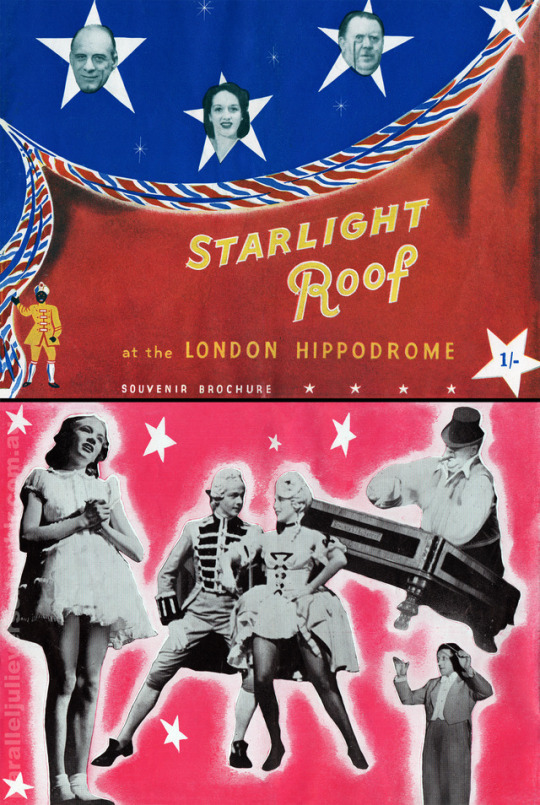
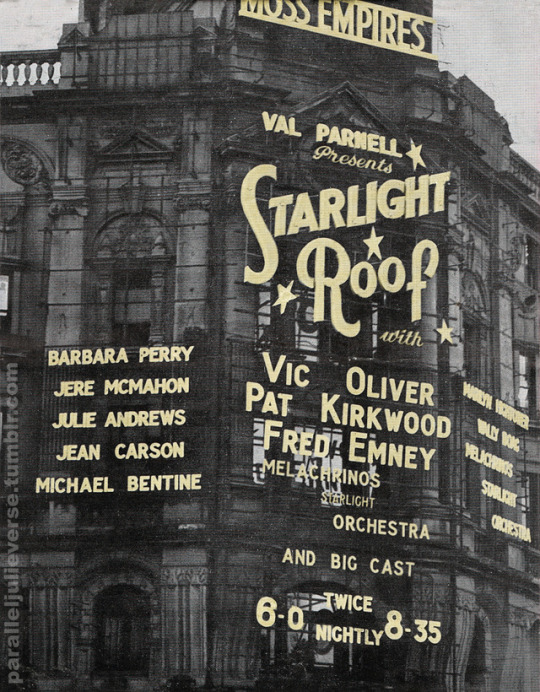
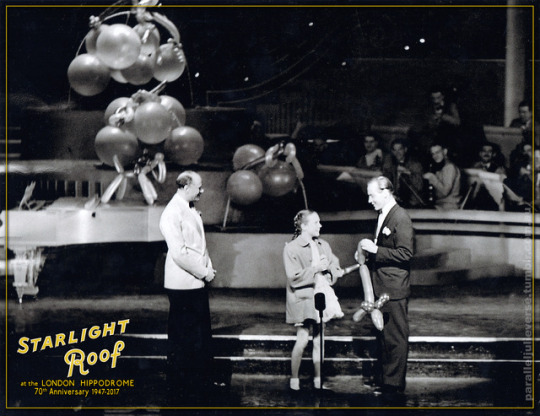

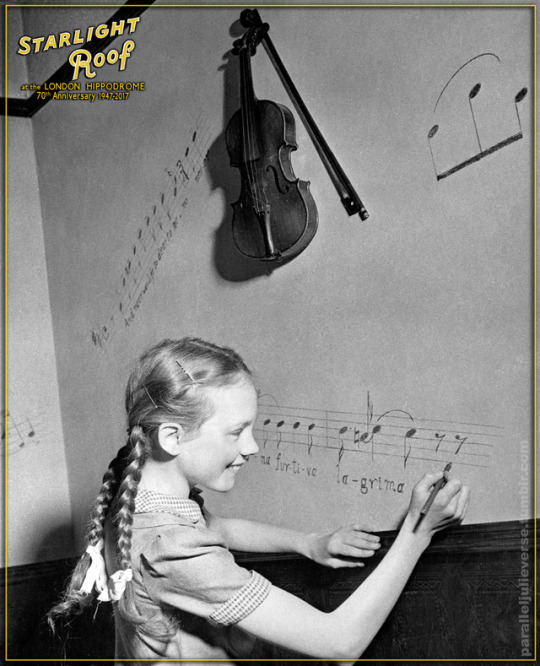
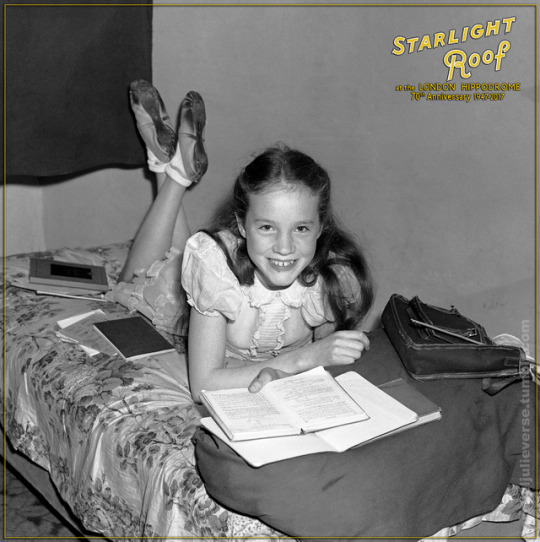


This coming week marks a milestone in the public life of Dame Julie Andrews: it will be 70 years since the legendary star made her professional performing debut at the tender age of 12 in Starlight Roof at the London Hippodrome on October 23, 1947.
As discussed in previous posts, the budding singer had performed intermittently prior to this date –– she had even sung for the Queen –– but Starlight Roof was her first fully “professional” engagement. As such, most commentators –– Julie included –– tend to regard her appearance at the Hippodrome as the birthdate of her official performing career (Cottrell, 46).
Produced by legendary impresario, Val Parnell, Starlight Roof was a glamorous West End revue of sparkling theatrical entertainments – songs, sketches, orchestral pieces, dances – performed by many of Britain’s leading variety stars. The fact that a juvenile performer of Julie’s age and inexperience was contracted to appear in such a high-profile theatrical bill is testament to the impression her talents made on the show’s production team.
Mind, Val Parnell had second thoughts about including Julie, literally the day before opening night. He worried that she “appeared too innocent, too young to be in a sophisticated revue” and might come “across as unnecessary and perhaps even inappropriate” (Andrews, 79). But after much haranguing on the part of Julie’s parents and, especially, her agent, Charles Tucker – who also had several other clients in the show – Parnell relented and allowed the 12-year-old singer to go on. It was a decision he must subsequently have been very glad he made.
Julie’s appearance in Starlight Roof came toward the end of the first act and was staged as something of surprise novelty. At the close of a preceding sketch with Wally Boag –– an American comic whose schtick included crafting extraordinary animal sculptures from balloons –– Julie would run up from the audience under the pretence of receiving one of his inflatable creations. In the course of scripted patter with Boag and revue maestro, Vic Oliver, Julie would reveal that she liked to sing. At Oliver’s invitation, she would then launch into the “Polonaise” from Ambroise Thomas’ Mignon, a coloratura showcase of trills, leaps and cadenze that climaxes with an ear-piercing high F above top C.
To say Julie’s performance in Starlight Roof was well-received would be an extreme understatement. The star herself recalls:
“[A]t the end I hit that high F above top C. There was a hush –– and then the audience went absolutely wild. People rose to their feet and would not stop clapping. My song literally stopped the show. The aria was so difficult, and I was barely twelve years old, a sprite of a thing, really, with this freakish voice, and it caused a sensation. It was the first…major stepping-stone…in my career (80).
A survey of press reports reveals the claim is no hyperbole. “Julie Andrews, 12-year-old coloratura soprano, stopped the show in her first West End appearance,” trumpeted Cecil Wilson of the Daily Mail (3). “A twelve- year-old girl in a party frock…stole London Hippodrome’s new musical, Starlight Roof, last night from the stars,” declared the Daily Express (3).
Even high-brow critics made mention of Julie as a highlight with The Observer noting how “a scrap of a child called Julie Andrews runs from [the] stalls and sings like an exaltation of larks” (Trewin, 2). The Stage declared that “Julie Andrews, the youthful prima donna, is fully entitled to her remarkable reception for some beautiful singing” (1). While The Illustrated London News noted that “one remembers first the smallest person in the show, a little girl called Julie Andrews who runs upon the stage from the stalls, and who turns suddenly from a child-in-search-of-a-balloon to an impressive young prima donna” (Trewin, 524).
Though perhaps the most prescient commentary on the birth of the surprise new star came from Harris Deans of Playgoer who wrote:
“Julie Andrews, a twelve-year-old-kid, shares the honours. Stage children are usually sophisticated little monsters, but here is a pleasant-looking, naturally-spoken child with a simply phenomenal voice.
I don’t wonder Vic Oliver asked her for her autograph. He should get the kid to number it for him. Miss Andrews’ first autograph should be worth something one day” (3).
Happy Septuagennial Anniversary, Julie!
Sources:
Andrews, Julie. Home: A Memoir of My Early Years. New York: Hyperion, 2008.
Cottrell, John. Julie Andrews: The Story of a Star. London: Arthur Barker, 1968.
Dean, Harris. “Around the Shows: Starlight Roof.” Playgoer. Vol 43. No. 473: 3
“Julie, aged 12, is a Show Stealer.” Daily Express. 24 October 1947: 3.
“Starlight Roof.” The Stage. 30 October 1947: 1.
Trewin, J.C. “At the Theatre: Mist and Stars.” The Observer. 26 October 1947: 2.
________. “The World of the Theatre: Under Review.” The Illustrated London News. 8 November 1947: 524.
Wilson, Cecil. “Pocket Money Star Stops the Show.” Daily Mail. 24 October 1947: 3.
© 2017, Brett Farmer. All Rights Reserved.
#julie andrews#starlight roof#london palladium#1947#70th anniversary#musical#revue#london#musical variety#polonaise#mignon
58 notes
·
View notes